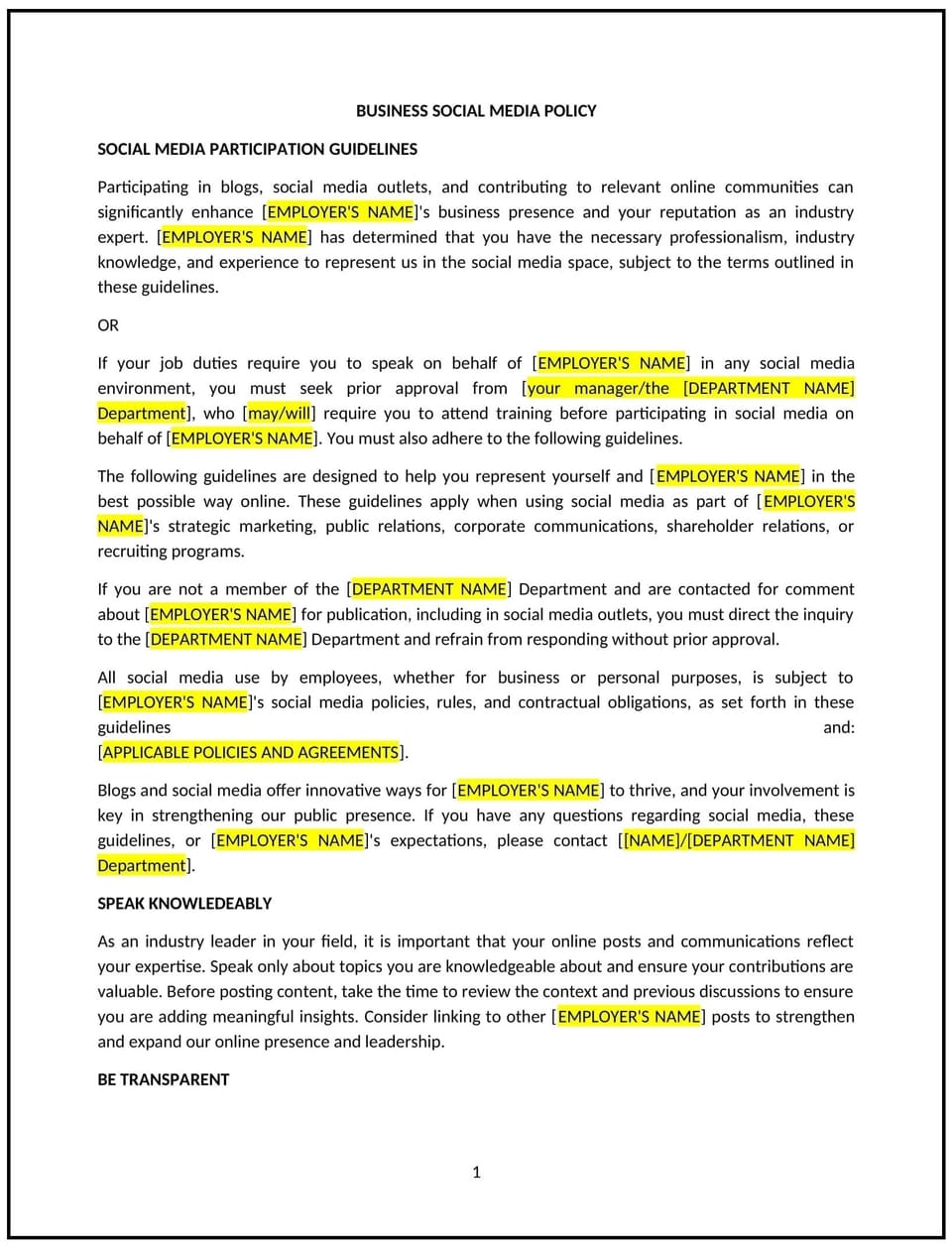Business social media policy (Minnesota): Free template

Business social media policy (Minnesota)
This business social media policy is designed to help Minnesota businesses establish clear guidelines for employees' use of social media, both for personal and professional purposes. It outlines expectations for maintaining professionalism, protecting the company’s reputation, and ensuring confidentiality and privacy in social media interactions.
By implementing this policy, businesses can promote responsible social media usage while protecting their brand and fostering a positive online presence.
How to use this business social media policy (Minnesota)
- Define acceptable use: Specify what constitutes acceptable use of social media for work-related purposes, including sharing company updates, engaging with customers, and promoting products or services.
- Set personal use guidelines: Establish boundaries for personal social media activity during work hours, ensuring it does not interfere with productivity or violate company policies.
- Address confidentiality and privacy: Emphasize the importance of safeguarding confidential company information and respecting privacy when engaging on social media.
- Outline the consequences of misconduct: Clearly communicate the potential disciplinary actions for violations of the social media policy, including spreading confidential information or engaging in inappropriate online behavior.
- Provide examples of prohibited behavior: Include examples of behaviors that are not acceptable, such as discriminatory comments, harassment, or negative commentary about the company or coworkers.
- Encourage professionalism: Remind employees that their actions on social media can reflect on the company, and that they should always maintain professionalism in their posts and interactions.
Benefits of using a business social media policy (Minnesota)
Implementing this policy provides several advantages for Minnesota businesses:
- Protects the company’s reputation: Establishes clear guidelines to prevent harmful or damaging online behavior that can negatively impact the business.
- Promotes professionalism: Sets expectations for employees to engage responsibly on social media while representing the company or in their personal use.
- Safeguards confidential information: Ensures that sensitive company data is not shared or disclosed on social media.
- Reduces risk: Minimizes the likelihood of legal issues arising from inappropriate posts, comments, or actions related to the company.
- Reflects Minnesota-specific considerations: Tailors the policy to meet local workplace practices, social media trends, and cultural norms in Minnesota.
Tips for using this business social media policy (Minnesota)
- Communicate clearly: Ensure that all employees understand the social media policy and the expectations for their online behavior, both professionally and personally.
- Provide regular training: Offer training to employees on the responsible use of social media and how to manage their online presence while working for the company.
- Monitor company social media accounts: Regularly review the business’s social media channels to ensure consistent messaging and adherence to company guidelines.
- Address issues promptly: When violations of the policy are identified, take corrective action to address the situation and prevent further issues.
- Update regularly: Review and update the policy periodically to reflect changes in social media platforms, new legal guidelines, and evolving company needs.
Q: What is acceptable use of social media for work-related purposes?
A: Businesses should establish clear guidelines regarding the use of social media for work-related purposes, including sharing company news, engaging with customers, and promoting company values or products.
Q: Can employees use social media for personal activities during work hours?
A: Businesses should set clear boundaries for personal social media use during work hours, emphasizing that personal use should not interfere with productivity or the company’s operations.
Q: What should employees do if they encounter a negative comment about the company online?
A: Employees should report any negative comments about the company to their manager or the communications team, who will handle the response in a professional and timely manner.
Q: How can businesses prevent employees from sharing confidential information on social media?
A: Businesses should include specific guidelines about confidentiality in their social media policy, emphasizing that employees must avoid posting sensitive or proprietary company information.
Q: What are the consequences if an employee violates the social media policy?
A: Violations of the policy can result in disciplinary action, ranging from a warning to termination, depending on the severity of the infraction.
Q: Should employees disclose their affiliation with the company on personal social media accounts?
A: Employees should disclose their affiliation with the company when posting about work-related topics, but they should also clearly state that their views are personal and do not represent the views of the company.
Q: How often should this policy be reviewed?
A: Businesses should review the social media policy annually or whenever significant changes occur in social media platforms, workplace practices, or relevant laws.
This article contains general legal information and does not contain legal advice. Cobrief is not a law firm or a substitute for an attorney or law firm. The law is complex and changes often. For legal advice, please ask a lawyer.


